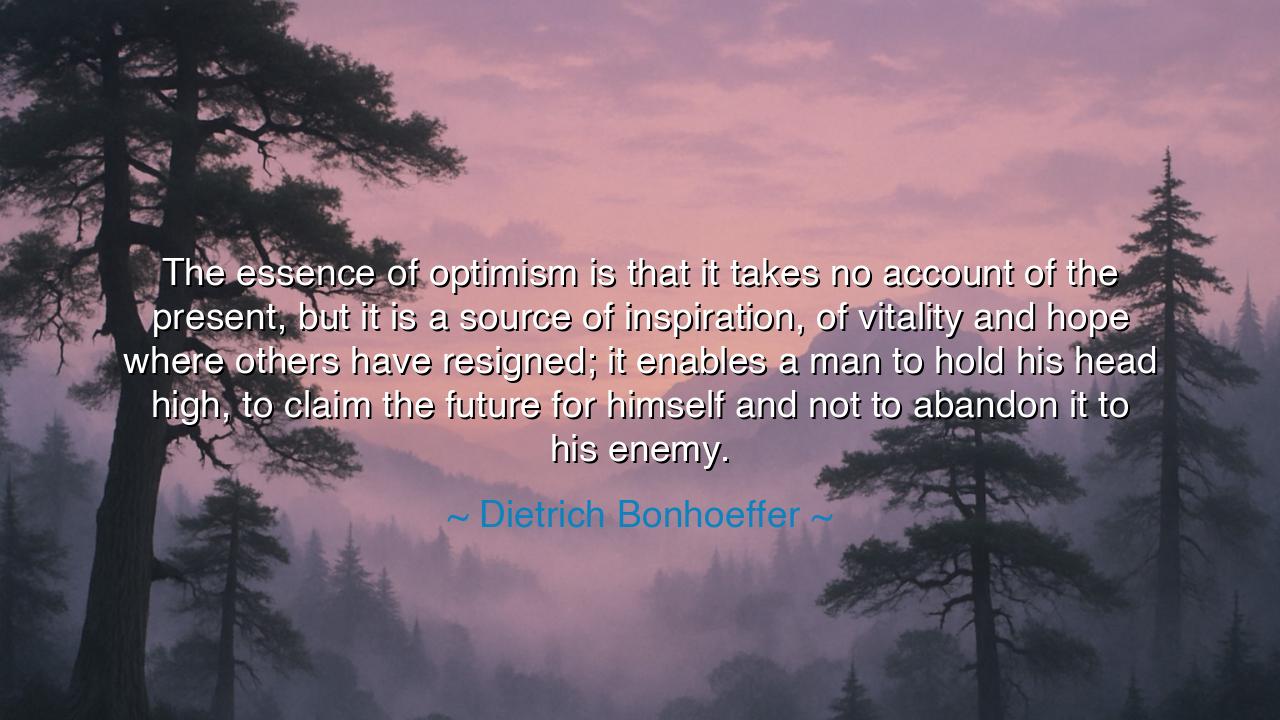
The essence of optimism is that it takes no account of the
The essence of optimism is that it takes no account of the present, but it is a source of inspiration, of vitality and hope where others have resigned; it enables a man to hold his head high, to claim the future for himself and not to abandon it to his enemy.






Dietrich Bonhoeffer speaks with profound clarity on the nature of optimism: "The essence of optimism is that it takes no account of the present, but it is a source of inspiration, of vitality, and hope where others have resigned; it enables a man to hold his head high, to claim the future for himself and not to abandon it to his enemy." These words cut to the very core of the human spirit, revealing optimism as a force not defined by the realities of the present, but by a vision of the future—one that is born of hope, courage, and an unwavering belief in possibility. Bonhoeffer, in his dark days, recognized that true strength comes not from surrendering to despair, but from embracing the potential of what can be, even when the world around us seems to be crumbling.
The ancients, too, understood the power of hope and vision. Consider the Greek hero Hercules, who was faced with seemingly impossible tasks, the Twelve Labors, that no other man could endure. Yet Hercules did not see his labors as the end of his journey. He saw them as opportunities to demonstrate his strength, his willpower, and his resilience. His optimism lay in his belief that no matter how overwhelming the challenge, he could overcome it and shape his own destiny. In the face of adversity, he held his head high, just as Bonhoeffer encourages, claiming the future as his own rather than succumbing to the overwhelming circumstances of the present.
Similarly, Marcus Aurelius, the Roman emperor and philosopher, faced the weight of the empire on his shoulders, battling not only foreign enemies but also the internal turmoil of the Roman state. His Stoic philosophy taught him that the future was something that could be shaped through virtue and resilience, not simply accepted as fate. Like Bonhoeffer’s vision of optimism, Aurelius’ teachings inspired individuals to focus on the higher ideals of life—wisdom, justice, courage, and temperance—instead of becoming bogged down by the harsh realities of their present circumstances. For Marcus, true strength lay in holding his head high, maintaining dignity even when faced with defeat, and continuing to fight for the greater good.
Bonhoeffer’s optimism also mirrors the story of Winston Churchill during the darkest days of World War II. At a time when Europe was consumed by war, and Britain was facing the very real threat of Nazi occupation, Churchill’s leadership and optimism became the foundation of resistance. He did not see the present—filled with bombed cities and the suffering of his people—as the final word. Instead, his words and actions were filled with an unshakable belief in a better future. He inspired his people to hold their heads high, to claim the future as their own, and to resist until victory was achieved. Churchill’s faith in the possibility of triumph in the face of overwhelming adversity reflects the same optimism that Bonhoeffer describes—one that empowers individuals to stand tall, even when the present is full of darkness and despair.
The lesson Bonhoeffer imparts is clear: optimism is not about ignoring the harshness of the present, but about choosing to believe in a better future, one that is shaped by our choices and actions. In moments of crisis, it is easy to resign, to surrender to the pressures and challenges that seem insurmountable. But optimism allows us to rise above these forces, to claim the future and our destiny. It empowers us to see beyond the suffering of today, to find the strength within ourselves to fight for what could be, rather than accepting what is. This belief in possibility fuels our vitality and drives us forward, even when the odds are stacked against us.
Bonhoeffer’s insight calls us to take action in the face of adversity. When the present seems grim, we must find the courage to hold our heads high, to step into the unknown with hope and faith in the future. Our actions today, motivated by optimism, will determine the world we leave behind for those who follow. Claim your future—do not let despair steal it from you. Whether it is in your personal battles, your contributions to society, or your larger vision for the world, let optimism be the force that propels you forward.
So, let us carry this wisdom with us. When the present moment is overwhelming, let us not turn away from it in fear or resignation. Instead, let us embrace it with the understanding that the future belongs to those who choose to believe, who create from the raw material of today a brighter tomorrow. As Bonhoeffer teaches, optimism is the key to claiming our future, holding our heads high, and never surrendering to the forces that seek to hold us down. The future is ours to shape—take it boldly, with hope, with resilience, and with a vision of what could be.






AAdministratorAdministrator
Welcome, honored guests. Please leave a comment, we will respond soon